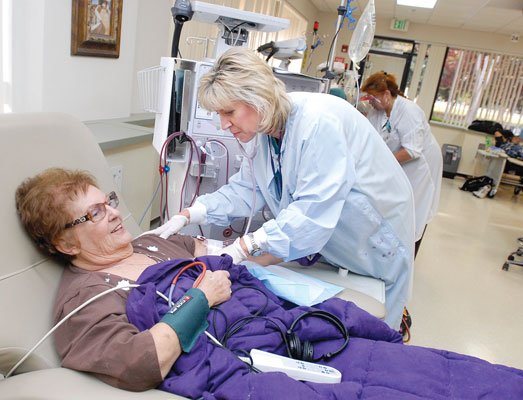Morgan Hill resident Greg Knapp lost a kidney to cancer, and the
other one is on its way to failure, resulting in major lifestyle
changes for himself and his wife.
Morgan Hill resident Greg Knapp lost a kidney to cancer, and the other one is on its way to failure, resulting in major lifestyle changes for himself and his wife.
Knapp, 63, has traveled to Gilroy four times a week during the past year to undergo supervised dialysis treatments at the Satellite Healthcare dialysis center.
Each treatment lasts four hours, plus another 90 minutes for preparation, cleanup, stabilization and travel time, Knapp said. His wife drives him to the treatments when he gets off work at Lockheed-Martin in San Jose, as dialysis often leaves patients weak and drowsy until they wake up the next morning.
Knapp estimated he spends a minimum of 100 hours in a car just to get to Gilroy and back to his home near Live Oak High School following the indispensable treatments, which “gets old really fast.”
Now that Satellite Healthcare plans to open a new dialysis center on Caputo Drive in Morgan Hill, Knapp and about 40 other dialysis patients who live in Morgan Hill will be relieved of at least the long drive to receive the regular medical care they cannot live without.
“It will be awfully nice to have a dialysis center in Morgan Hill,” Knapp said. “The convenience would be incredible.”
The new center is scheduled to open in about 10 months to a year, according to Gary Cellini, vice president of strategic planning for Satellite Healthcare. The proposed 6,300-square-foot facility obtained a conditional use permit from the city in September.
With 16 dialysis stations proposed for the Morgan Hill center, and the capacity to serve up to three shifts of patients as the need for dialysis grows, Satellite will be able to serve up to 96 patients – opening “excess capacity” to accommodate future patients including some in South County who are now on a waiting list. It will also relieve some of the burden at the Gilroy facility which is almost full, and will eventually allow patients to do overnight dialysis if they choose to – a key step to receiving the treatments at home.
Plus, with a dialysis center closer to home, patients will be more likely to consider more treatments, mimicking a closer-to-normal blood filtration schedule.
“The closer the center is to your home, the better it is,” Cellini said. “Some patients prefer to go to the center because they don’t feel confident (to do it at home), and there is some socialization with other patients. And for superior outcomes, it’s more effective to receive more dialysis treatment.”
Normal kidneys work constantly to filter the blood and regulate water, chemicals and minerals. They remove drugs and toxins from the body, and release hormones that help regulate blood pressure and maintain other functions critical to survival.
About 26 million Americans suffer from chronic kidney disease, the term that describes a number of conditions that cause the organs to slowly lose their function and then stop working completely.
Patients whose kidneys have failed must receive either a kidney transplant or spend the rest of their lives undergoing dialysis treatments, typically at least three times a week. About 400,000 Americans currently receive such ongoing dialysis treatment.
Morgan Hill Community Health Foundation president Joe Mueller said the local dialysis center will provide significant advantages to local residents.
“It adds the capability to Morgan Hill residents that need that type of treatment to get it in-house, on potentially very convenient timing for when they need it,” Mueller said.
In addition to serving more patients, an added benefit is the new center will employ at least 12 people, according to city staff.
Morgan Hill resident and dialysis patient Paula Walter, 71, also receives dialysis at the Gilroy center. A number of previous conditions can lead to kidney failure, including diabetes or high blood pressure. For Walter, it was a heart problem she suffered about 20 years ago, plus a family history of kidney failure. Since then, her kidneys have slowed down, and she has been on dialysis, three times per week, for about five years – with each treatment requiring about the same time as Knapp’s.
The new center in Morgan Hill will cut her dialysis travel time from about 10 minutes to “about four minutes,” and her husband will be able to return home while he waits for her.
Besides keeping Walter alive, dialysis also provides regular blood work, allowing her to stay updated on other possible conditions.
“I don’t think the public realizes how many people suffer from kidney failure,” said Walter, a retired administrative assistant. The new dialysis center “is going to save time, which, when you’re on dialysis, is precious.”














